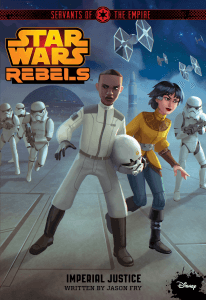Review: Servants of the Empire: Imperial Justice by Jason Fry (or, The Expert Thumb Twiddler Finally Does Something)
I wish for it to be acknowledged that I am currently quite sick *coughs pointedly*. But I’m still here. This isn’t me being melodramatic* or wanting to illicit sympathy**. I say it because I want to convey how much I enjoyed Imperial Justice, the third book in the Servants of the Empire series by Jason Fry and published by Egmont, and how I wanted to write this review and convey my enthusiasm for it as quickly as possible and totally not because I very well might die soon***.
*Okay, maybe a little bit. I have been wandering around the house muttering in my deepest voice ‘I am vengeance. I am the night. I am Batman’, after all.
**Though a little wouldn’t hurt, is all I’m saying.
*** Okay, maybe a little melodramatic. Maybe.
So with that said, on to the review proper:
Be warned: mild spoilers for this book, and recapping spoilers for the previous book(s).
Imperial Justice is, in essence, about repercussions. The last book saw one of our main characters, Zare Leonis, succeed in fooling (perhaps?) the first Inquisitor into believing that he’s Force sensitive, as well as gain an understanding of how to accomplish his goal of finding his captured (possibly?) sister, Dhara. It also saw our other main character, Merei Spanjaf, successfully hack a high profile government building – almost getting away scot-free, but for the fact that one of her hacking bugs malfunctioned. The Imperial Forces then launched an investigation to uncover who was behind the hack – an investigation led by Merei’s own mother. The ensuing family dinners are (spoiler) somewhat fraught with tension.

Let’s handle these one at a time. I’ll start with Zare, since he is, nominally at least, the main character (though, if you’ve read my last review, you’ll know that I don’t entirely agree with this). Zare continues his cadet training. For about the first two thirds of the book, that’s really it. Oh, I should add that another minor character, one lieutenant Roddance, who, aided by Zare’s fellow cadet Nazhros Oleg, becomes an even bigger thorn in Zare’s side. The two, convinced of his treason, attempt to catch him out. A usually intriguing storyline but, in this instance somewhat lacking in ruthlessness and so I was somewhat let down by their attempts. Considering it’s the big bad Empire, I wanted a little bit more than the playground taunts and whines of ‘ummm I’m telling on you!’ level harshness. Well, I mean, Oleg’s an Imperial. Playground taunts do rather fit with their modus operandi. Truly it is a brutal regime.
Having said that, it does pick up quite significantly two-thirds in, when he finally gets some meaty plot to handle. I’m not going to spoil it, but I was quite pleased with it, with how it was written and how it panned out, especially as it deals with more mature themes. And as Zare’s story finally gained traction, I began to like Chiron and Zare’s dad more and more. They are good people, mostly, who believe in the Empire and happily, with nary a blip of cognitive dissonance, believe their spiel. This is crucial, because dictatorships don’t survive on fear and bigotry alone. It needs a populace who sees these abhorrent actions as not just being for the common good, but are in and of themselves good.
Now onto Merei, who maintains her position as plot advancer, and to which I say: woah boy. I think I love her.
In the last book, to gain certain tools to aid her in her attempted hack, she had to engage with a low level crime boss by the name of Laxo. As anyone who’s seen a mafia film, you can guess that Laxo wasn’t too willing to let Merei go without using her to further his own business. This, itself, is fairly standard, but she handles it with wit, ingenuity and aplomb, despite being in the grips of fear and despair, that left me quite in awe of her as a character. Oh my, yes, I do like a woman of her kidney.
What? It’s a phrase from The Three Musketeers. Honest.
One top of that, she had to contend with her own mother’s investigation into her hack, which, well, was laughably inept. I’m a bit of a science nerd, with one of my interests being crime and forensic science. Now, for example, in a brilliantly idiotic move, they showed a known unreliable witness hundreds of photos of girls from the schools in the area, all but guaranteeing a negative result. This is because the mind is not a perfect recollection device. It’s not a camera, you can’t just think back and see what happened perfectly. No; when you remember something, you reconstruct the event, and you do so with all the vagaries of time, bias and focus playing into that. All this is to say, all those pictures would have influenced the witness’s memory so that, even if she had had a reasonably accurate recollection of what Merei looked like to begin with, this would not have been the case afterwards. But having said that, it was still interesting to get a peak into the Imperial machine at work and at the bureaucratic level (even if it adds to my wonderment of just how the Empire has survived this long).

The culmination of these two plots was very well handled. I really have no complaints. It was some of the most pleasing and tightest writing I’ve read in a while.
I have one more aspect with regards to plot to discuss, but since I’m on the subject of writing, I thought I’d bring up a minor gripe: the writing is generally good and strong, though at the beginning there is the obligatory recapping of the situation, which wasn’t that well handled. These things are never easy and, like in this book, is usually done with a massive info dump. But it can be done well, just with minor asides when appropriate in certain scenes early on in the book. And indeed, Imperial Justice even does that, and does them subtly and well (these scenes even repeat some of the information from the info dump, making the beginning doubly useless). It was awkward and a somewhat flat way to start the book, but to be honest I’d just finished another book just prior to this (which also happened to be the third in the series), whose policy on such things was to say practically nothing, so I won’t moan too much.
Right. Back to the last plot point. Here’s the thing: I have a lot of my friends in the military. I’ve heard, from them, from their families, loved ones and know from personal experience, what it’s like to be away from each other, what it’s like to come back. How Zare detailed this felt so authentic to me that it was like listening to one of my own friends describe their own troubles. Zare and Merei, for those who aren’t caught up, are in a relationship, and that relationship is strained in this book, because they can’t be together, because even when they’re apart, they can’t be entirely open and honest with each other (thanks, Palpatine), and I’d often hear my friends’ sentiments echoed by the young couple that it was sometimes quite eerie. And it wasn’t just the big things, but little details that help sell it. When Zare is on leave, he makes up his bed so that it’s in pristine condition. While he admires the crispness of its lines, he remarks with surprise how this wouldn’t have been the case before he had joined the academy. Again, this echoes real life experience, from my once slobbish friends (I say this with love) quite stunned by their desire to do cleaning. It’s this minute authenticity where Fry excels. From suppressed irritation at relatives watching (propoganda) news, to Zare adjusting to civilian life, right up to the big things like difficulty maintaining relationships, which helps sell the more far-fetched things like space ships and lasers and weird, exotic drinks like caf.

I appreciate, too, how the budding rebels act within their limits. I’m reminded of Karen Traviss, author of the Republic Commando novels (which I fully recommend), which had somewhat similar set ups, with her subversive, rebellious characters hidden in a sea of armour. With Traviss, her clones would have been kitted up with unbreakable comms, unlimited funds etc. While I sort of mean that as a criticism, in her books there was at least a solid foundation of why that could be the case. Lesser writers would perhaps have the same set up, but none of the foundation. Similarly, and in the case of Fry and his story, I feel other writers would grant Zare and Merei all these techno-magical powers and there’d be little to no feasible limitations on their interactions and spying – but Fry doesn’t do this. His characters, as I’ve said, can’t communicate freely, can’t just sneak away and slip into secure areas to get all the information they want, or at least just enough to advance the plot*. When they do gain new intel, they have often had to fight for every kilobyte of it. They’re hindered by their positions, their skills (or lack thereof) and indeed their age and inexperience. I almost didn’t notice, these were quite deft touches.
*Though these things do happen, it’s never to any great extent, and it always feels within the bounds of reasonable skill. They can and do use secret comms (or at least did in the first book) and can access sensitive information at will, but now they’re small, powerless gnats up against a colossal, ruthless, mostly uncaring and paranoid Empire.
All that said, it’s the third book. I’ve been saying in each review that I’m looking forward to the next one. I’m genuinely looking forward to the next one (as I did with each book, but more so with the last in the series), because it promises to be a particularly good ending. But at the same time, I desperately wanted some weightier advances in plot than what we’ve currently got. This, for me, was a bit of a let-down. It was a good, enjoyable read, but by this point I wanted just that little bit more.
Star Wars: Servants of the Empire: Imperial Justice by Jason Fry and published by Egmont is out now in UK bookstores. Also the internet.
*Passes out*
Author: Michael Dare
Michael Dare is a writer, lives in the UK, and has been slowly coming to terms with the realization that he is not Sherlock, but Watson. He loves Star Wars, dislikes blue milk. Enjoys jumping sharks. Survives on the tears of sexist men, and cheeseburgers.

